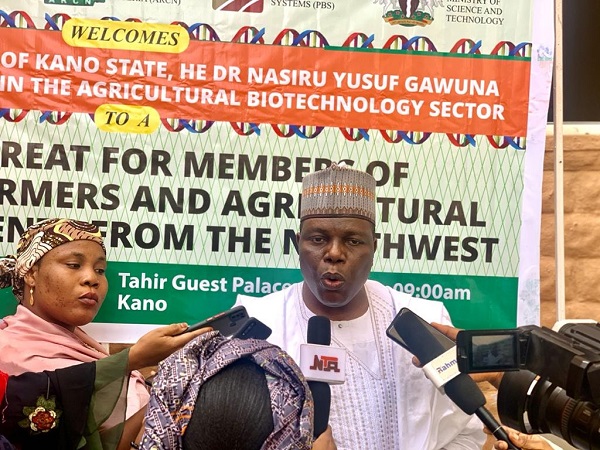
The director-general of the National Biotechnology Development Agency (NABDA), Prof. Abdullahi Mustapha has acknowledged the role extension agents play in biotechnology development, saying they are strategic in the advancement of biotechnology practices in agriculture.
He made this assertion during a regional retreat for northwest-based farmers and extension agents on the science, safety, benefits and applications of the genetic modification technology in agriculture, held in Kano State.
Abdullahi stated that agricultural yield in Nigeria is poor compared to other parts of the world, hence the introduction of technologies to ensure that the nation’s quest for food and nutritional security is guaranteed.
He revealed that the retreat was NABDA’s contribution to efforts by the government to revive the extension component of agriculture to ensure that crops perform optimally.
The NABDA boss promised that the interaction will continue until the Nigerian local farmers get it right. He said once the extension agents get it right the farmers automatically will.
Similarly, the acting director, monitoring and evaluation, Institute for Agricultural Research (IAR), Zaria, Prof. Aisha Mukhtar shed some light on what the IAR has achieved in the genetic improvement and production of crops like maize, sorghum, cowpea, sunflower etc.
In her goodwill message, she acknowledged the importance of extension agents who take all the technology from the research institute to the farmers.
Earlier, in his welcome address, the deputy governor of Kano State, Dr. Nasiru Gawuna, represented by his special adviser on agriculture, Dr. Hafiz Muhammed, reminisced on times when the northwest (particularly Kano State) was the nation’s leading producer of maize, cowpea and groundnut, until the agricultural system nose-dived.
He observed that biotechnology was presenting the nation with another chance to get it right and called on the nation to grab it but ensure that the extension part is right, given that extension is the backbone of any meaningful agricultural system. He said extension services will bring biotechnological knowledge to the farmers who will cultivate the varieties.
The governor added that Kano State is investing in agriculture, with lots of strategies lined up to spur production and enhance the livelihood of farmers.
Enlightening extension agents on roles in biotechnology deployment, the former regional director, AATF, Dr. Issoufou Kollo, asserted that modern agriculture could not exist without a good, functional extension system.
He listed the roles of extension agents to include collaboration with scientists to develop educational material/support for farmers, collecting and transmitting field data and farmers’ opinions to the scientists, collecting statistical data for the government (crop production and yield) etc.
Kollo reasoned that, for these to be possible, extension workers would have to build good working relationships with farmers by familiarising themselves with and respecting the culture and social psychology of the farmers and, most importantly, being good communicators.
Similarly, in his presentation, the executive director, National Agricultural Extension and Research Liaison Services (NAERLS), Prof. Emma Ikani spoke on the emergency of biotechnology crops. He listed the opportunities in the Nigerian agricultural space to include good climate, good water resources and agribusiness opportunities, as well as the setbacks (poor funding, distraction by discovery of petroleum) and hailed agricultural extension as the vehicle that conveys the required knowledge, skill and competence to field actors.
He stressed that it is impossible to transition from subsistence farming to commercial agriculture without extension workers because their roles – linking research to farmers, translating scientific language into clientele’s native language and disseminating biosafety messages – are very important.
He insisted that, if the nation’s present and future population have to be fed, traditional methods cannot be counted on.
Earlier in her presentation on the retreat objectives, the country coordinator, Open Forum on Agricultural Biotechnology (OFAB), Nigeria chapter, Dr. Rose Gidado revealed that Nigeria has released two genetically modified crops (cotton, cowpea) for commercial planting in the country and that extension agents and farmers would play crucial roles in the commercialisation of these crop varieties but this could be hampered because of what little information they have about the crop.
She added that if the extension agents are not properly educated on the best agronomic practices required for these crops, Nigeria’s hope of enhancing agricultural productivity using modern biotechnological tools may remain a mirage.
“It is, therefore, the knowledge that extension agents in the northwest require to move this sector forward, that has brought us here. This is our first outing in Kano. Agricultural biotechnology is a new field of science with the potential of addressing the challenges faced by most farmers. It is gradually gaining strategic space in national discourse in Nigeria, especially with this recent approval for the commercialisation of Bt. Cowpea after the Bt. Cotton,” she said.
Gidado maintained that the extension agents that interface with farmers on new technologies and innovations and the farmers themselves who use these technologies must be brought up to speed with requirements such as stewardship guidelines, agronomic practices and other issues that would enable the technology to deliver on its promises.
Speaking further, Gidado added that the retreat aims to provide accurate and up-to-date information about advances in the biotechnology sector since its adoption in Nigeria to ensure that extension agents and farmers are fully acquainted with facts, information and practices that will effectively enhance productivity.
She highlighted the objectives of the meeting thus; To equip extension agents and farmers in the northwest with developments in biotechnology and how such changes can improve the lives and general wellbeing of the rural communities; To educate the extension agents and farmers on the best agronomic practices required for Bt. Crops; To expose the extension agents and farmers to the practical outcome of adopting biotechnology in agricultural practice as it relates to yield; To assure farmers and the extension agents of the safety of Bt. Crops; Guarantee farmers of access to Bt. crops’ seeds in terms of quantity and timely delivery and to demystify the biotechnology concept and address issues of misunderstanding in the face of opposition from anti-GMO groups.


